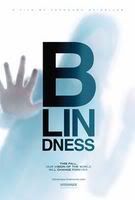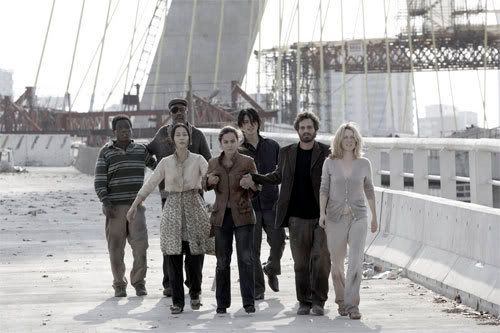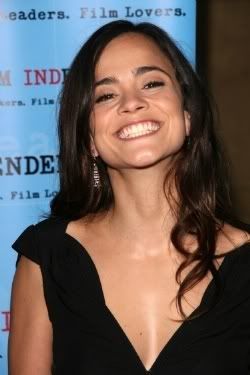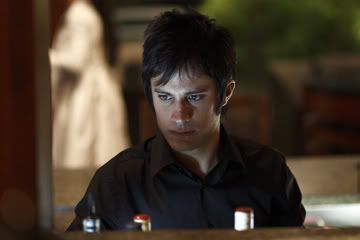
I really wanted to love the film Blindness. Had been anticipating it for months. Tried ignoring the largely-negative reviews that had been trickling in since it premiered in Cannes back in like May or so. The book its an adaptation of, by author Jose Saramago, rocked my shit when I read it over a month ago---a powerful almost-horror-ish premise, fully-realized characters without actual names, a nice escalation of darkness-to-hope, and some pretty raw setpieces. Everything I'd love in a story, and it met all expectations and potential.
This flick, on the other hand, not so much. It's not that the movie is awful, or even piss-poor; it's just "okay," and considering the source material it had to work off of, just "okay" is shameful. Look at the acting talent here: Julianne Moore (who I've always really liked on screen, a fan since she killed it in both Boogie Nights and Magnolia, the great joints from my dude Paul Thomas Anderson), Mark Ruffalo (emerging as one of my top male thesps in the game), talented cutie Alice Braga, and others. The director: Fernando Merielles, who handled the face-smacker that is City of God. The pedigree was in place for a quality, hard-hitting time at the movies.

Problem is, though, none of the messages and/or allegory conveyed by Saramago in his 1995 book come across, at all here. It just plays as a bit of dystopian art, with Merielles flexing his "artistic prowess" to the point of overdose. Meaning, the blindness felt by those in the story is a "white sickness," where victims feel as if they're "swimming in milk." Getting a bit too post-production-happy over this detail, Merielles drowns the screen in thick, flowing whiteness for about 60% of the movie, a tactic that's pretty cool and effective the first couple of times, but after awhile, begins to reak of "look at me, I'm making an avant-garde, progressive movie here, because I'm edgy" rather than simply letting the narrative and characters themselves do the work. It's almost as if Merielles didn't have enough confidence in actor Don McKellar's script here, and felt the impulse to mask some of its drawbacks visually. Turns into a bit of a visual clusterfuck at times.
The storytelling, though, falls flat in the process. Shit just happens. Moments that should delicately plant emotional seeds come off as a tired, fed-up farmer throwing a bag of seeds in the air, letting the contents of the bag scatter across a concentrated area. None aiming for anywhere in particular. Just landing, one after the other, like the scenes here.
And about that script....I'm still trying to put my finger on why this is, but, seriously, none of the emotional impact felt in the book registers nearly half as much in the film. Sure, there's one button-pushing centerpiece that actually does hit its mark in the movie, and I'll get into that later. But when it comes down to the quieter, character interactions,they're nearly all botched. It felt like, other than Moore's and Ruffalo's characters, none of the people on screen were given room to grow, room to score sympathy; where as, in the book, each and every individual is fleshed out. Right, because of high page counts and written word benefits. But still, there's been book-to-film adaptations before that haven't sacrificed character for flare, like is done here.
In the book (and I hate to keep comparing the book to film, but when you have a book as dope as Blindness, a subpar movie take is inexcusable and needs to be compared, in my eyes), the character of The Girl with the Dark Glasses (played here by Alice Braga) was my favorite, and unexpectedly so. She's a prostitute with a heart of gold, and has a couple of choice moments in the text: in a moment of vulnerability, she sleeps with the The Doctor (played by Mark Ruffalo) only to be caught by his wife (Julianne Moore, whose character is the only person in the story who can still see), and then later, she has a heart-to-heart with The Old Man with the Eyepatch (played here by Danny Glover) where they profess earnest love for each other, despite the large age gap, a generational difference turned obsolete due to their shared blindness. But in the movie, neither of these moments (and both do appear) prove memorable at all. They both just happen, and then its on to the next scene.
[Alice Braga, clearly happy about something....I'm guessing it's not after seeing this movie]

And its not due to the actors' efforts, because I liked all the performances here. Especially that of Gael Garcia Banal, who gives the story's most despicable presence, its one true villain, a cocksure arrogance, but not of a purely-fiendish caliber. You get the sense that his dark side shown here is the result of giving up on life, due to the outspread of blindness. He figures, what good will kindness and compassion do now? Might as well go for broke and fend for self. And as flipped by Bernal, its a pretty impressionable white-flag-wave. At least that's how I saw it.
[Bernal]

To place blame for the movie's misfire, though, I have to sim my scopes at the pacing, the little force with which Merielles executes these moments in the narrative context. A big blunder on full display in the story's third act, where our focal-point characters flee from their quarantined-home/insane asylum, and venture out into a littered, chaotic, destroyed urban landscape. Visually, Merielles did nail this section---the ruined city is pretty chilling, and the blind denizens tripping and falling, some walking around nude, do evoke a rather creepy image of a fallen society trying to maintain. But in the book, there's so much character exposition and growth that happens once they leave the asylum, a majority of which is either clumsily-condensed or just outright deleted in the movie. Making the "hopeful"/happy ending seem rushed and not fully-earned. Its a shame, really, because the positive conclusion in the book was great to me, and we all know how much I prefer bleak, dark, dirty endings.
I have to get going to an engagement party now, so I have to wrap this up, sadly (this blog is all on the fly, freestyle shit). I didn't even get to show love toward a couple of great moments in the film: the deliriously-shot and pulled-off bleakness and perverted despair of the gang-rape sequence, and when Moore's character tries fleeing a barren supermarket with food bags and is attacked by starving blind folk, in an almost zombie-movie-like-moment.
But in the end, Blindness frustrated and disappointed a bit too much for me to recommend or salute.
**Now let's just hope that Quarantine doesn't do the same next weekend.....though, I did find out that super-fly Dania Ramirez is in Quarantine, a bit of casting I was totally fucking clueless about,that makes Quarantine even more promising. Just the sight of Ramirez sends my hormones into overdrive, can't lie. In terms of eye pleasures, she's Oscar worthy. Actual acting chops, however, well let's just say that she tries hard, I'm sure.
Hey, looks like I've found my next Quarantine Watch entry....Nice.




No comments:
Post a Comment